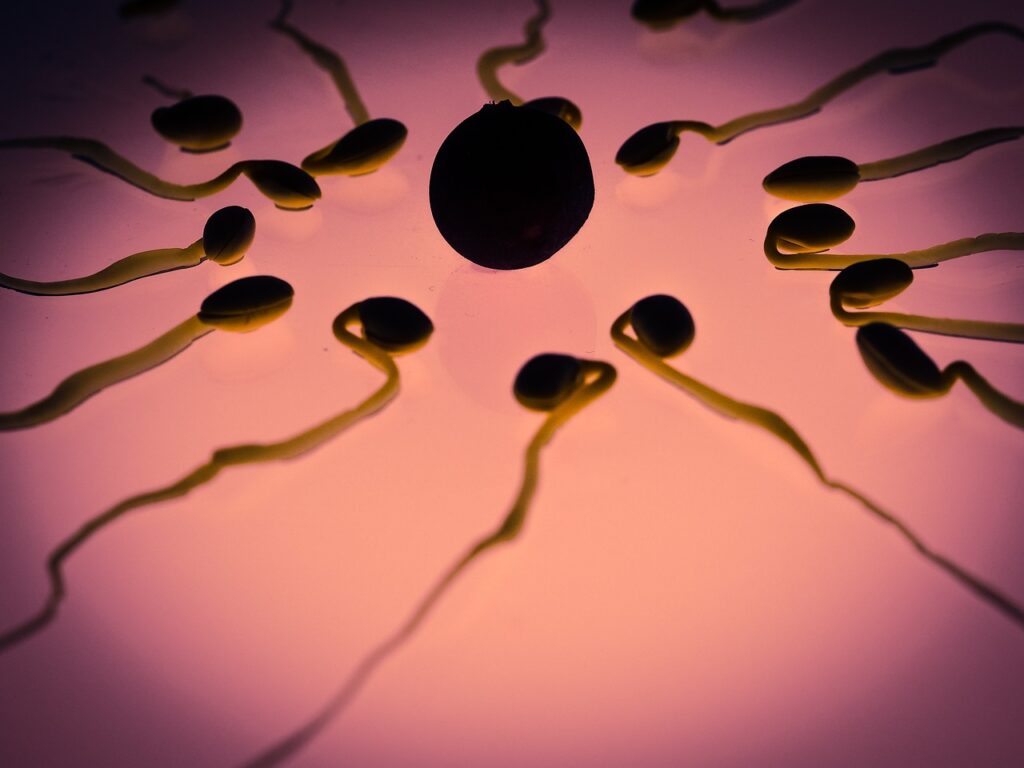Male fertility is the first thing for pregnancy. So, you must know how to strengthen sperm for pregnancy.
When you and your partner are trying to conceive, there are chances that you may face infertility problems. This is a common problem and there are basic remedies for it.
Infertility is always treatable however there are some factors you can look into to boost your sperm health. This blog is about how to strengthen sperms for pregnancy. If you are facing serious infertility problems, consult a sexologist doctor as soon as possible.

What Is Male Fertility?
Male infertility is when a man faces difficulties in becoming a father due to issues with his reproductive system. These problems can be caused by various factors that affect the quality, quantity, or functioning of sperm, which are essential for fertilizing an egg.
Some common reasons for male infertility include:
Low Sperm Count:
Some men may have fewer sperm in their ejaculate than normal, making it harder to achieve pregnancy.
Abnormal Sperm Shape:
Irregularly shaped or sized sperm can struggle to reach and penetrate the egg.
Poor Sperm Movement:
Sperm that don’t swim well may have difficulty reaching the egg inside the female reproductive tract.
Ejaculation Problems:
Conditions like premature ejaculation or retrograde ejaculation, where semen goes into the bladder instead of being ejaculated, can affect fertility.
Blockages:
Obstructions in the male reproductive system, like a blockage in the vas deferens or epididymis, can prevent sperm from being released.
Hormonal Imbalances:
Problems with hormone levels, such as low testosterone, can disrupt sperm production.
Varicocele:
This condition involves enlarged veins in the testicles, which can raise testicular temperature and impact sperm production.
Genetic Factors:
Some genetic abnormalities can lead to male infertility.
Environmental Factors:
Exposure to toxins, radiation, or excessive heat can affect sperm production.
Lifestyle Factors:
Unhealthy lifestyle choices like smoking, excessive alcohol consumption, drug use, and obesity can contribute to male infertility.
To diagnose male infertility, doctors typically consider the person’s medical history, perform a physical examination, and analyse a semen sample to assess sperm quality and quantity. Treatments may involve lifestyle changes, medications, surgery, or assisted reproductive techniques like in vitro fertilization (IVF) or intracytoplasmic sperm injection (ICSI) to help couples achieve pregnancy. If you suspect male infertility, it’s a good idea to consult a healthcare provider or a fertility specialist for a comprehensive evaluation and guidance on appropriate treatments or interventions.

What are signs of Unhealthy Sperm?
Unhealthy sperm can exhibit various signs or characteristics that may affect fertility and the ability to conceive. Some of the common signs of unhealthy sperm include:
- Low Sperm Count: A low sperm count, known as oligospermia, is when the concentration of sperm in the ejaculate is below the normal range. This reduces the chances of successful fertilization.
- Poor Sperm Motility: Sperm motility refers to the ability of sperm to move effectively. If a significant portion of sperm is immobile or moves sluggishly, it can hinder their ability to reach and fertilize an egg.
- Abnormal Sperm Morphology: Sperm with irregular shapes or sizes may have difficulty penetrating and fertilizing the egg.
- Low Semen Volume: A low volume of ejaculated semen can reduce the chances of sperm reaching the egg.
- High Sperm DNA Damage: Sperm with damaged DNA can lead to failed fertilization or an increased risk of miscarriage.
- Reduced Sperm Forward Progression: Sperm are classified based on their forward progression, with higher grades indicating better movement. Poor forward progression can impair sperm’s ability to reach the egg.
- Increased Sperm Agglutination: Sperm agglutination is when sperm clump together, which can interfere with their ability to swim and penetrate the egg.
- Elevated Sperm Oxidative Stress: Increased levels of oxidative stress can damage sperm cells and affect their viability.
- High Sperm Abnormalities: Sperm can have various structural abnormalities, such as multiple tails or heads, which can reduce their ability to fertilize an egg.
- Low Seminal Fluid pH: An overly acidic or alkaline pH in seminal fluid can adversely affect sperm function.
It’s important to note that the presence of one or more of these signs does not necessarily mean a person cannot conceive. The degree of impact on fertility can vary, and other factors, such as the female partner’s health and fertility, also play a significant role in the ability to conceive. If you suspect issues with sperm health or fertility, it’s advisable to consult a healthcare provider or a fertility specialist who can perform a comprehensive evaluation and provide guidance on potential treatments or interventions.

How To Strengthen Sperm for Pregnancy
Strengthening sperm for pregnancy involves various lifestyle changes and strategies that can help improve sperm quality and increase the chances of conception. Following are effective ways to strengthen sperm for pregnancy.
Maintain a Healthy Diet:
A balanced diet rich in vitamins, minerals, and antioxidants is crucial for sperm health. Include plenty of fruits, vegetables, whole grains, and lean proteins in your diet. Foods high in antioxidants like vitamin C and E can help protect sperm from damage.
Stay Hydrated:
Proper hydration is essential for sperm production. Drink plenty of water to ensure optimal sperm volume and motility.
Exercise Regularly:
Regular physical activity can help maintain a healthy weight and improve overall health. However, excessive or intense exercise can negatively impact sperm production, so it’s essential to strike a balance.
Manage Stress:
High stress levels can affect fertility. Practice stress-reduction techniques like meditation, yoga, or deep breathing exercises.
Avoid Smoking and Alcohol:
Both smoking and excessive alcohol consumption can harm sperm quality. Quitting smoking and limiting alcohol intake can have a positive impact on fertility.
Maintain a Healthy Weight:
Obesity can lead to hormonal imbalances, which can affect sperm production. Achieving and maintaining a healthy weight can improve fertility.
Limit Exposure to Toxins:
Reduce your exposure to environmental toxins and chemicals that can harm sperm. This includes avoiding exposure to pesticides, heavy metals, and certain chemicals at work or in your environment.
Avoid Excessive Heat:
High temperatures can negatively affect sperm production. Avoid hot baths, saunas, and tight-fitting underwear that can raise testicular temperature.
Get Enough Sleep:
Adequate sleep is vital for overall health, and it plays a role in sperm production. Aim for 7-9 hours of quality sleep per night.
Supplements:
Some supplements, such as folic acid, zinc, and coenzyme Q10, have been associated with improved sperm health. Consult a healthcare provider before taking supplements.
Limit Caffeine Intake:
Excessive caffeine consumption may negatively affect sperm motility. Moderate your coffee and caffeine intake.
Regular Sexual Activity:
Regular ejaculation can help improve sperm quality by preventing the accumulation of older, less healthy sperm. Aim for a healthy balance between sexual activity and abstinence.
Consult a Healthcare Provider:
If you suspect fertility issues, it’s essential to consult a healthcare provider or fertility specialist. They can conduct tests to assess sperm quality and provide guidance on appropriate treatments or interventions.

Make your Surroundings pleasant…
Excessive heat can have a detrimental impact on sperm health. It places stress on sperm and may reduce their quality. To support healthy sperm, it’s important to avoid situations that expose your reproductive area to high temperatures. Here are some practices to consider:
- Hot Tub Avoidance: Prolonged exposure to hot water, such as in a hot tub or sauna, can elevate the temperature of your testicles. This can potentially harm sperm production and quality. Limit your time in hot tubs and saunas to protect your sperm.
- Avoid Extended Sitting: Sitting for extended periods, especially with a laptop on your lap, can generate excess heat around your scrotum. This can negatively affect sperm health. Take regular breaks to stand and move around, reducing heat exposure to your reproductive area.
- Laptop Placement: Placing a laptop directly on your lap can lead to increased scrotal temperature due to the heat generated by the device. Whenever possible, use a hard surface or a laptop cooling pad to reduce heat exposure.
Maintaining a pleasant and sperm-friendly environment is essential for those trying to conceive. By avoiding prolonged exposure to heat sources, you can help reduce the stress on your sperm and enhance their health, ultimately increasing your chances of achieving a successful pregnancy.
Remember that improvements in sperm quality may take time, so it’s important to be patient and consistent with these lifestyle changes. Additionally, both partners should be actively involved in the process of preparing for pregnancy, as female factors can also influence fertility.

Maintain a healthy weight
Maintaining a healthy weight is a crucial factor in promoting optimal sperm health. Whether you’re underweight or overweight, your body mass index (BMI) can significantly influence the quality and quantity of your sperm.
Impact of Obesity:
Carrying excess body weight, especially in the form of obesity, can have adverse effects on sperm health. It can lead to hormonal imbalances and inflammation, which negatively affect sperm production and function. Obesity is associated with lower sperm counts and reduced sperm motility, making it more challenging to achieve conception.
Impact of Being Underweight:
Conversely, being underweight can also be detrimental to sperm health. Insufficient body fat can lead to hormonal imbalances, specifically a decrease in testosterone levels, which are crucial for sperm production. This can result in lower sperm counts and reduced sperm quality.
Achieving a Healthy Weight:
The key is to strive for a healthy weight that is appropriate for your height and body type. This involves maintaining a BMI within the recommended range, which is generally considered to be between 18.5 and 24.9. By doing so, you aim for a body that not only appears healthy and strong but also supports strong internal sperm health.
To achieve and maintain a healthy weight:
- Balanced Diet: Adopt a balanced and nutritious diet. Consume a variety of foods that provide essential nutrients, such as vitamins, minerals, and antioxidants. Avoid excessive consumption of processed or high-calorie foods.
- Regular Exercise: Incorporate regular physical activity into your routine. Exercise helps control body weight, improve overall health, and promote hormonal balance.
- Consult a Healthcare Provider: If you’re unsure about the appropriate weight for your body type or need guidance on a weight management plan, consult a healthcare provider or a registered dietitian. They can provide personalized advice and recommendations.
- Monitor Your Progress: Keep track of your weight and make adjustments to your diet and exercise regimen as needed to achieve and maintain a healthy weight.
By focusing on achieving a healthy weight, you can positively impact your overall health and significantly enhance your chances of promoting strong internal sperm health, which is vital for fertility and the potential to conceive a child.

What can I drink to make sperm for Pregnancy stronger?
To support and promote stronger sperm, it’s important to maintain a healthy lifestyle and diet. While there are no specific beverages that can magically make your sperm stronger, there are some dietary choices and drinks that can contribute to overall sperm health. Here are some suggestions:
- Water: Staying well-hydrated is essential for sperm production and motility. Drinking an adequate amount of water helps maintain the right consistency for semen.
- Fruit Juices: Fresh fruit juices, particularly those rich in antioxidants like vitamin C (e.g., orange juice), can support sperm health by reducing oxidative stress and protecting sperm from damage.
- Green Tea: Green tea is packed with antioxidants and has been associated with improved sperm quality. The polyphenols in green tea may help protect sperm from damage.
- Herbal Teas: Some herbal teas, like ginseng and maca root tea, are believed to have potential benefits for male fertility. However, more research is needed in this area.
- Milk: Milk is a good source of essential nutrients like calcium and vitamin D, which play a role in maintaining overall health, including reproductive health.
- Smoothies: Creating smoothies with a combination of fruits, vegetables, and yogurt or milk can provide a variety of vitamins and minerals that can support sperm health.
- Pomegranate Juice: Some studies suggest that pomegranate juice may have a positive impact on sperm quality, potentially enhancing sperm motility and reducing oxidative stress.
- Moderate Coffee Consumption: While excessive caffeine can have negative effects on sperm, moderate coffee consumption (1-2 cups per day) is generally considered safe and may have some benefits due to its antioxidant properties.
It’s important to note that no single beverage is a magical solution for stronger sperm. A healthy and balanced diet is key, along with maintaining a healthy lifestyle. Reducing alcohol and caffeine intake, avoiding smoking, managing stress, and getting regular exercise are also crucial factors in supporting sperm health. If you have specific concerns about your fertility or sperm quality, it’s advisable to consult a healthcare provider or a fertility specialist for personalized guidance and evaluation.
Conclusion of Boosting Sperm for Pregnancy
Remember that it can take several months to see improvements in sperm quality, as sperm take about two to three months to develop and mature. If you suspect fertility issues, it’s advisable to consult a healthcare provider or a fertility specialist. They can conduct tests to assess sperm health and provide guidance on appropriate treatments or interventions specific to your situation. Additionally, both partners should be involved in the process of preparing for pregnancy, as female factors can also influence fertility.


